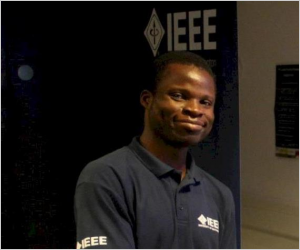Mar 16 2013
ECS undergraduate student Arinze Ekwosimba gives an excellent account of the dedication and wide knowledge of ECS students in a feature interview with EEWeb – the Electrical Engineering Community.
 Arinze Ekwosimba
Arinze Ekwosimba
Arinze, who is in the third year of his MEng degree in Electronic Engineering with Wireless Communications and has been President of the Student Chapter of the IEEE over the last year, explains why he was drawn to study engineering when growing up in Nigeria, and talks about the strengths of the ECS Electronic Engineering degree, particularly some of the project work involved, such as the D4 Systems Design Exercise. This is a very competitive design and build project, sponsored for the last four years by BAE Systems Detica. Last year’s project, in which Arinze took part and which he describes as his favourite project so far, involved the students in designing and building a football-playing robot which had to perform a certain number of tasks. The teams worked intensively towards a final challenge day (video), which also involved pitching their robots as commercial products.
“The highlight of my second year of studies was our D4 Group Design Project which saw me work in a team of 6 to design and implement a football-playing robot within two weeks,” says Arinze. “It remains one of the biggest challenges I have faced in my degree; my team had to work together to apply a lot of theoretical concepts we had been taught to achieve the project goals. In the end, we had a working prototype. The project exposed us to the great difference between theory and practice: simulations don’t always give the correct result! Above all though, it was fun, educative, and gave us something to be proud of.”
This year’s programme for the IEEE branch has been very successful, and also included the first time that ECS students had taken part in the worldwide IEEEXtreme 24-hour programme challenge. Eight Southampton teams competed very successfully, with many students on hand to provide support and encouragement over the 24 hours. The branch also has very successful partnerships with companies such as G-Research, Xyratex, Dialog Semiconductors, and Imagination Technologies.
Like many ECS engineering students, Arinze intends to enter the engineering profession when he graduates and to return to Nigeria to help the country’s development. “I strongly believe that most of the daunting challenges facing my home continent - poor health care delivery, poor power supply, lack of basic infrastructure, poor education and famine - can be addressed using the power of technology,” he says. “I want to return home and be part of the solution.”
Arinze makes a strong plea for the value of engineering to be fully recognized. “Technology is the future, with engineering at the centre,” he says, adding: “I hope engineering continues to contribute to the drive and success of humanity; all for a better world.”